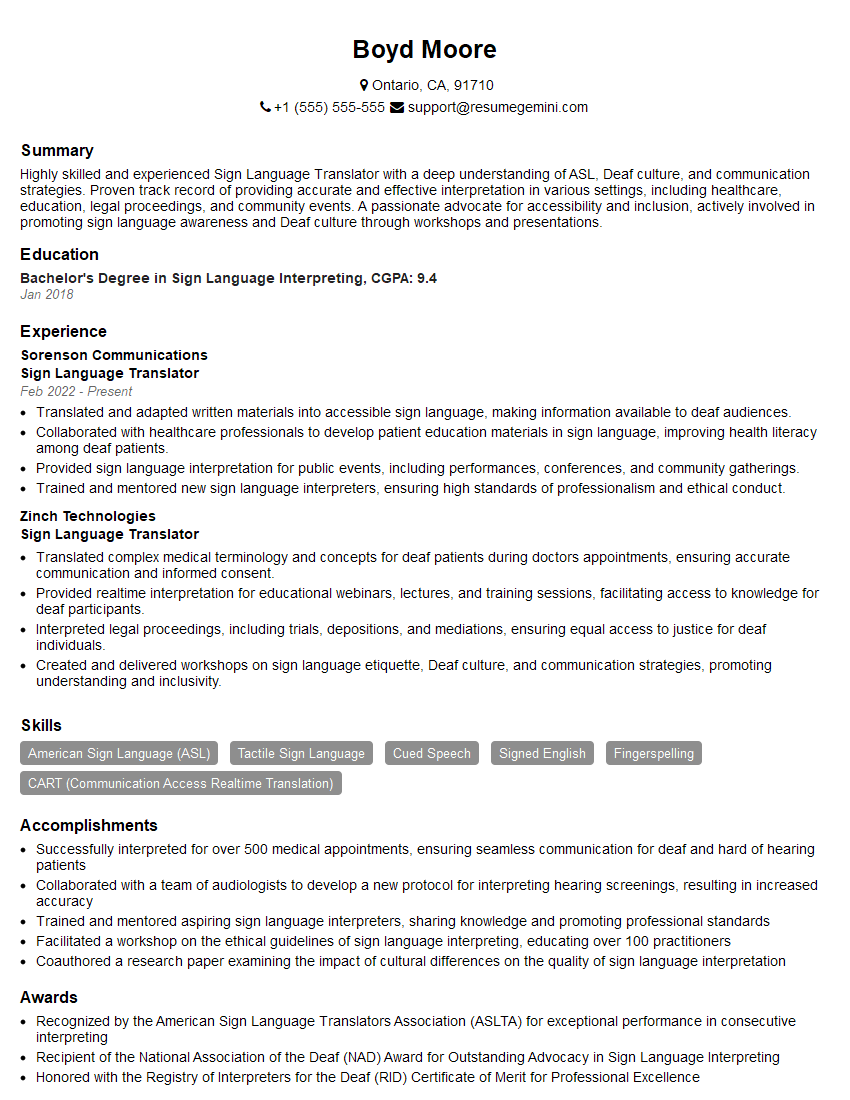Are you a seasoned Sign Language Translator seeking a new career path? Discover our professionally built Sign Language Translator Resume Template. This time-saving tool provides a solid foundation for your job search. Simply click “Edit Resume” to customize it with your unique experiences and achievements. Customize fonts and colors to match your personal style and increase your chances of landing your dream job. Explore more Resume Templates for additional options.

Boyd Moore
Sign Language Translator
Summary
Highly skilled and experienced Sign Language Translator with a deep understanding of ASL, Deaf culture, and communication strategies. Proven track record of providing accurate and effective interpretation in various settings, including healthcare, education, legal proceedings, and community events. A passionate advocate for accessibility and inclusion, actively involved in promoting sign language awareness and Deaf culture through workshops and presentations.
Education
Bachelor’s Degree in Sign Language Interpreting
January 2018
Skills
- American Sign Language (ASL)
- Tactile Sign Language
- Cued Speech
- Signed English
- Fingerspelling
- CART (Communication Access Realtime Translation)
Work Experience
Sign Language Translator
- Translated and adapted written materials into accessible sign language, making information available to deaf audiences.
- Collaborated with healthcare professionals to develop patient education materials in sign language, improving health literacy among deaf patients.
- Provided sign language interpretation for public events, including performances, conferences, and community gatherings.
- Trained and mentored new sign language interpreters, ensuring high standards of professionalism and ethical conduct.
Sign Language Translator
- Translated complex medical terminology and concepts for deaf patients during doctors appointments, ensuring accurate communication and informed consent.
- Provided realtime interpretation for educational webinars, lectures, and training sessions, facilitating access to knowledge for deaf participants.
- Interpreted legal proceedings, including trials, depositions, and mediations, ensuring equal access to justice for deaf individuals.
- Created and delivered workshops on sign language etiquette, Deaf culture, and communication strategies, promoting understanding and inclusivity.
Accomplishments
- Successfully interpreted for over 500 medical appointments, ensuring seamless communication for deaf and hard of hearing patients
- Collaborated with a team of audiologists to develop a new protocol for interpreting hearing screenings, resulting in increased accuracy
- Trained and mentored aspiring sign language interpreters, sharing knowledge and promoting professional standards
- Facilitated a workshop on the ethical guidelines of sign language interpreting, educating over 100 practitioners
- Coauthored a research paper examining the impact of cultural differences on the quality of sign language interpretation
Awards
- Recognized by the American Sign Language Translators Association (ASLTA) for exceptional performance in consecutive interpreting
- Recipient of the National Association of the Deaf (NAD) Award for Outstanding Advocacy in Sign Language Interpreting
- Honored with the Registry of Interpreters for the Deaf (RID) Certificate of Merit for Professional Excellence
Certificates
- National Interpreter Certification (NIC)
- Certified Deaf Interpreter (CDI)
- National Board for Certification of Interpreters (NBCI)
- Commission on the Deaf and Hard of Hearing Interpreters (CDHH)
Career Expert Tips:
- Select the ideal resume template to showcase your professional experience effectively.
- Master the art of resume writing to highlight your unique qualifications and achievements.
- Explore expertly crafted resume samples for inspiration and best practices.
- Build your best resume for free this new year with ResumeGemini. Enjoy exclusive discounts on ATS optimized resume templates.
How To Write Resume For Sign Language Translator
- Quantify your accomplishments with specific metrics whenever possible.
- Highlight your understanding of Deaf culture and your commitment to accessibility.
- Showcase your ability to work independently and as part of a team.
- Emphasize your passion for sign language and your desire to make a difference in the lives of deaf individuals.
Essential Experience Highlights for a Strong Sign Language Translator Resume
- Translate and interpret oral and signed communication, ensuring accurate and real-time understanding.
- Maintain high ethical standards and confidentiality in all professional interactions.
- Collaborate with individuals from diverse backgrounds, including deaf, hard of hearing, and hearing.
- Adapt and translate written materials into accessible sign language.
- Contribute to the development of new tools and techniques to enhance communication.
- Stay up-to-date on the latest sign language research and best practices.
Frequently Asked Questions (FAQ’s) For Sign Language Translator
What are the key skills required for a successful Sign Language Translator?
Fluency in American Sign Language (ASL), strong communication skills, cultural sensitivity, and a deep understanding of Deaf culture are essential for a successful Sign Language Translator.
What are the different settings in which Sign Language Translators work?
Sign Language Translators work in various settings, including healthcare, education, legal proceedings, community events, and media productions.
What is the career outlook for Sign Language Translators?
The career outlook for Sign Language Translators is positive, with projected growth in employment due to the increasing demand for accessible communication services.
What are the educational requirements to become a Sign Language Translator?
Most Sign Language Translators hold at least a bachelor’s degree in sign language interpreting or a related field, along with specialized training and certification.
What are the professional development opportunities available for Sign Language Translators?
Sign Language Translators can pursue continuing education, attend workshops and conferences, and engage in mentorship programs to enhance their skills and knowledge.
What is the ethical code of conduct for Sign Language Translators?
Sign Language Translators adhere to a strict code of ethics, including confidentiality, impartiality, and respect for the privacy and dignity of individuals.